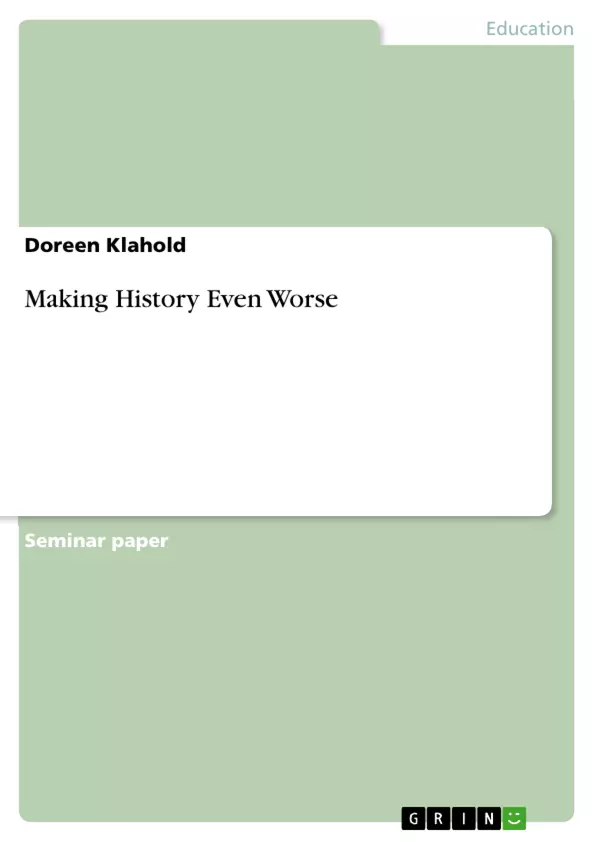Many a German would wish to undo his country’s past. We would prefer that Hitler had never been born, that the Third Reich and especially the Holocaust would have never taken place. However, how is it that an immense number of the (non-German) alternate histories about the Third Reich – and there are actually quite a lot – depict the world as not better or even worse without Hitler. This essay will focus on the uchronian nightmare scenario Making History written by the British author Stephen Fry in 1996 and winner of the Sidewise Award for Alternate History. First, I will treat the protagonist’s utopian wish to create a better world by preventing Hitler from being conceived and the dystopian effect of the “changing” of history. This playing with expectations attracts the reader’s attention and shows the complexity of history and society, even though it naturally has a merely entertaining tenor as well. Second, I will briefly analyze that the style of rewriting history, the contrasting juxtaposition of the different chapters and particularly the two opposing parts of the novel, and, finally, the ironic tone implied continuously underline the sometimes satiric developments of fate and the naïve wish of making a better, “utopian” world without being able to assess the outcome. Finally, against the concept of alternate history in general, it will be seen that alternate history is a means to examine history and present, but how history would have turned out differently is hard to tell since it depends on more than just individual events or persons. By thinking about how things could have been worse, we perhaps learn to accept that everything that happens shapes us and our present, as barbaric as it might be.
Inhaltsverzeichnis (Table of Contents)
- 1. Introduction: Changing the Course of History
- 2. Making History Even Worse
- 2.1 Dystopian Characteristics in Making History
- 2.2 Narrative Structure and Style of Rewriting History in the Novel
- 2.3 The Essence of History and Responsibility in Alternate Holocausts
- 3. Conclusion: Accepting and Learning from History
Zielsetzung und Themenschwerpunkte (Objectives and Key Themes)
This essay examines Stephen Fry's novel Making History, an alternate history dystopian novel focusing on the impact of preventing Adolf Hitler's birth. The essay analyzes how the novel explores the concept of altering history and the potential consequences of such actions. It also examines the narrative structure and style employed by Fry in rewriting history and the ethical implications of creating an "alternate Holocaust" that is arguably worse than the real one.
- The inherent unpredictability of history and the difficulty of anticipating consequences.
- The potential for unintended consequences in attempting to alter historical events.
- The role of responsibility in dealing with historical trauma and the ethical implications of attempting to rewrite history.
- The nature of utopia and dystopia in alternate history and the ways in which these concepts are presented in the novel.
- The narrative techniques employed in alternate history novels, particularly the juxtaposition of past and present, and the satirical elements used to convey the themes of the novel.
Zusammenfassung der Kapitel (Chapter Summaries)
The essay begins with an exploration of the concept of alternate history and the appeal of rewriting past events. It highlights the potential for both positive and negative outcomes in such scenarios, particularly in relation to the Holocaust.
The second chapter focuses on the dystopian characteristics of Making History. It analyzes how the novel presents a society that has developed in a negative direction despite the protagonist's efforts to create a better world. This chapter explores the satire of utopian aspirations in the novel, highlighting the unintended consequences of preventing Hitler's birth.
The essay concludes by examining the novel's themes of responsibility and the importance of learning from history. It suggests that the novel offers a cautionary tale about the dangers of attempting to alter the past, emphasizing the unpredictability of history and the potential for creating worse outcomes.
Schlüsselwörter (Keywords)
This essay examines the concept of alternate history, focusing on dystopian elements in the context of Stephen Fry's Making History. The essay delves into the ethical implications of creating an "alternate Holocaust" and analyzes the narrative structure and style employed by Fry in his exploration of this complex and sensitive topic. Key terms and concepts include dystopia, alternate history, uchronia, Holocaust, responsibility, unintended consequences, and satire.
Frequently Asked Questions
What is the central premise of Stephen Fry's "Making History"?
The novel explores an alternate history scenario where the protagonist attempts to prevent the birth of Adolf Hitler, only to find that the resulting future is even worse.
What are the dystopian characteristics in the novel?
Despite the absence of Hitler, a different, more "efficient" leader emerges, leading to a society that remains dark and oppressive, illustrating the unpredictability of historical change.
How does the novel use satire and irony?
Fry uses an ironic tone to highlight the naivety of the wish to create a "utopian" world without understanding the complex mechanics of history and society.
What does the essay say about the essence of history?
It argues that history depends on more than just individual persons or events; it is a complex web where removing one element can have unintended, catastrophic consequences.
What is the ethical implication of an "alternate Holocaust"?
The novel examines the responsibility of dealing with historical trauma and the dangers of trying to "undo" the past rather than learning from it.
- Quote paper
- Doreen Klahold (Author), 2013, Making History Even Worse, Munich, GRIN Verlag, https://www.grin.com/document/233591



